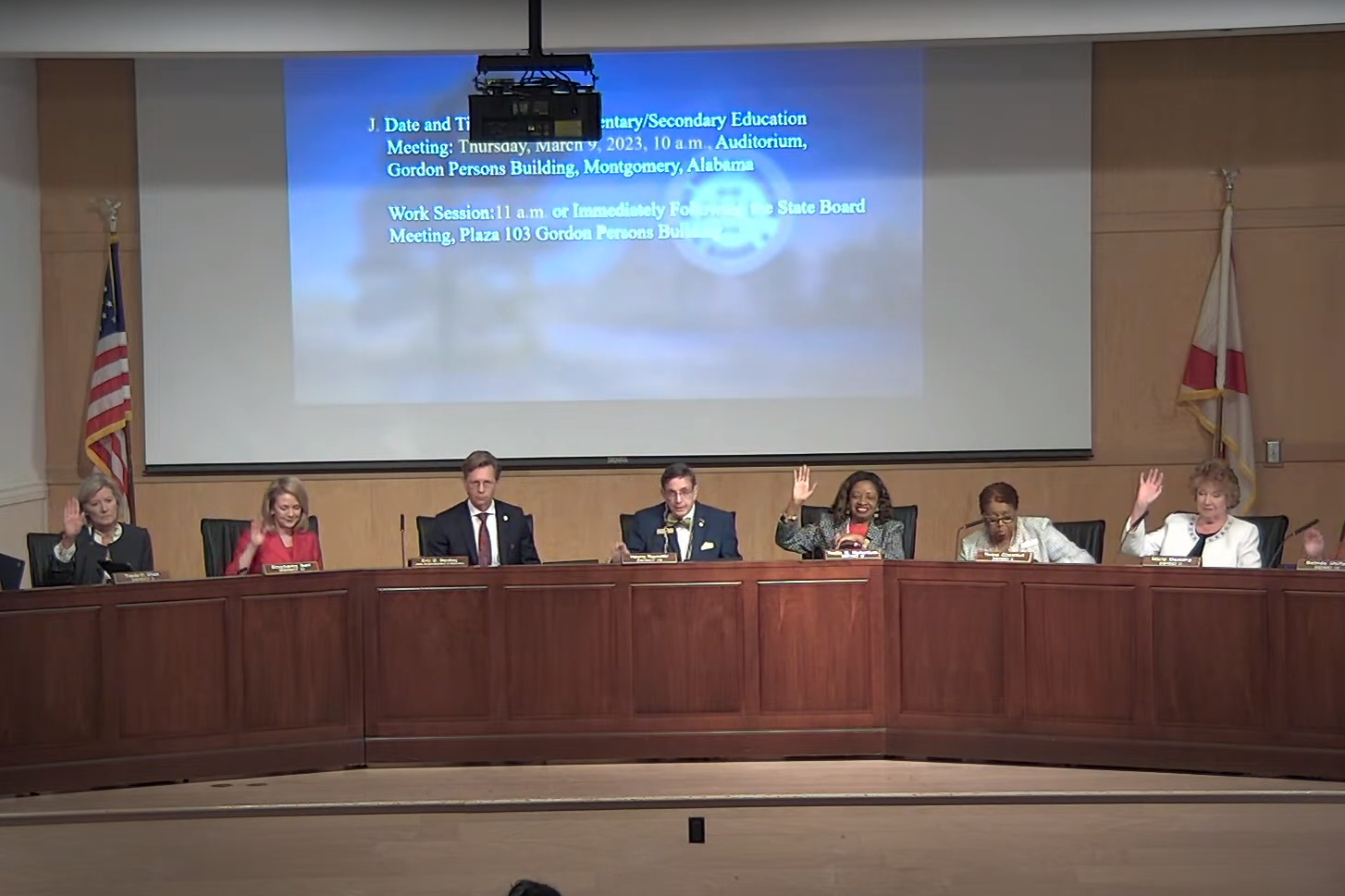The Alabama State Department of Education (ALSDE) is slated to vote on the K-3 English language arts (ELA) textbooks on March 9, though specific books are currently kept confidential by state law.
In February 2022, the state education board delayed approving ELA textbooks for K-3 due to state regulations requiring that textbooks be published in the past three years, which left the board with only one publishing company.
"One of the publishing companies, what they presented was older than the five-year cutoff," said District 1 state board member Jackie Zeigler. "So one of the changes we made, we didn't extend it greatly, but a little bit more than five years. It sounds like a long time, but five years, when you're talking about stories and things like that, it was just awful that we could not, by law, put it onto the opportunities for any of the districts to purchase it using state textbook money."
On February 9, the textbook committee presented its recommendation for the 2023-24 school year, but according to state law, the recommendations are confidential. The textbook committee deliberated between 14 publishers, but its narrowed recommendation is part of the confidential list delivered to the state board.
Zeigler said she didn't remember why the state law requires the textbook committee's recommendations be kept confidential but believed there was a legitimate reason to justify it.
"Does it make things more difficult? Yeah," Zeigler said. "So when parents are out there, and your constituents are out there viewing all 14 of those publishing companies that sent out their publications, would it be easier for them, instead of looking through 14, just to look at four, or five, or two or whatever? I would deem it would be easier, but I don't remember why that particular part was put into place."
In 2019, the legislature passed the Literacy Act, which seeks to improve reading proficiency in K-3 students by having teachers perform assessments and requiring all students to read at a third-grade level before proceeding to the fourth grade. However, the legislature delayed the latter requirement until the 2023-24 school year in 2022.
Zeigler sits on the literacy task force, which verifies the considered textbooks conform to the requirements of the Literacy Act.
"We have to be very cautious," Zeigler said. "I'll be honest, some of these textbooks, they might put on a sticker that says, 'this follows the science of reading.' Well, no, it doesn't. It's very definitive, and we know what works. And that what we have the responsibility is to make sure that what is being presented makes sure that we have those standards."
State board Vice President Dr. Wayne Reynolds, who will be presiding over the March 9 meeting in place of Gov. Kay Ivey, said the board would vote to either accept or reject the recommendation or table the consideration.
According to Reynolds, the board-approved list of textbooks will be available to local school boards to choose from, which has not been an option for the past year.
"There's more than one book for each grade level available to local school systems," Reynolds said. "And after the state textbook committee and the school board, if it approves an adopted list, then local school systems get to choose from that point. And the presentation we got last year, because of some other laws about publishing dates, there was only one textbook available for adoption, And I and other board members thought that was not appropriate. So, we did not reject the K-3 books; we just removed it from our adoption process. Because if we reject a book, then the local school system cannot adopt it. If we adopt a book, then the local school system has the option of adopting it."
Kevin Balius, the ELA chairperson for the textbook committee, has written a paper titled "Increasing LGBTQ+ Competencies in Preservice Teacher Training Programs." In addition to being the chairperson, Balius is an Academic Supervisor at the Mobile County Public School System and an educator at the University of South Alabama.
Since public schools are prohibited by state law from discussing gender identity and sexual orientation in K-5 classrooms unless "developmentally appropriate," some have expressed concern that the chairman's advocacy work could run afoul of current law.
According to Zeigler, the comprehensive vetting process by the literacy task force, the textbook committee and the ALSDE prevents anything contrary to state law from becoming an approved textbook.
"First of all, the literacy task force sends forth their vetting process of what they've done with the publications that were sent to make sure they fulfill the letter of the law," she said. "So from there, the textbook committee has those recommendations about how the law is being followed. There is a very stringent rubric that the committee must follow, and from 24 [committee members]. That's why they do it the way they do it. Because how does anybody know anybody's intent? It's possible that if Mr. Balius had never been selected as chairperson, it never would have been noted; he would have just been one of the committee members. It just so happens he was selected as chairperson."
To connect with the author of this story or to comment, email craig.monger@1819news.com.
Don't miss out! Subscribe to our newsletter and get our top stories every weekday morning.










